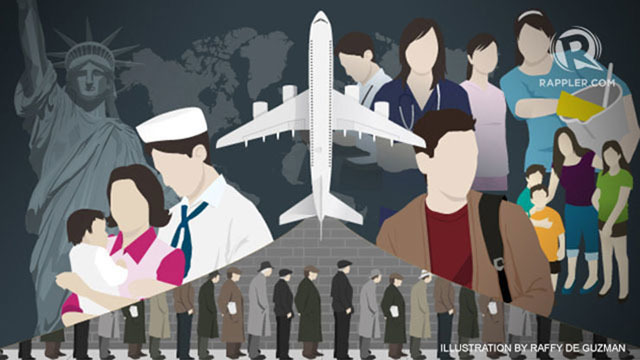New law creates social welfare attachés for OFWs

MANILA, Philippines (UPDATED) – President Rodrigo Duterte has signed a law that creates social welfare attachés for countries with a large number of overseas Filipino workers (OFWs).
Republic Act (RA) No. 11299, also known as An Act Establishing the Office for the Social Welfare Attaché was signed on April 17. A copy of the law was shared with media on Tuesday, July 16.
The law amends Section 2 of RA No. 8042 or the Migrant Workers and Overseas Filipinos Act of 1995 to include providing protection and assistance to Filipino migrant workers "especially for workers who are vulnerable to physical, emotional, and psychological stress or abuse."
The law tasks the Department of Social Welfare and Development (DSWD) to deploy social welfare attachés to countries with large OFW populations in coordination with the Department of Foreign Affairs (DFA) and Department of Labor and Employment. Attachés must have the minimum qualifications set by both the Civil Service Commission and DSWD. (INFOGRAPHIC: Getting to know the OFWs)
Social welfare attachés will be responsible for:
- Managing cases of OFWs and other Filipinos in distress such as as trafficking victims, illegally recruited workers, rape or sexual abuse victims, maltreated or abused workers, and abandoned or neglected children
- Prepare reports on the social welfare situation of OFWs and complete surveys
- Establish a network with overseas-based social welfare agencies and individuals who can assist in providing social services
- Monitor and respond to needs and problems of OFWs and their families
- Create and maintain a database of OFWs and their families to effectively provide services
- Submit reports to home offices of the DSWD and DFA on plans and activities done, updates on OFWs, and recommendations for workers in their assigned countries. This will also serve as part of a semi-annual report to Congress.
- Provide information to OFWs on the DSWD and its attached agencies
- Other functions related to social services, as may be directed by the head of the Philippines' diplomatic post in assigned countries
Funding for the law will be included in the DSWD's programs to be sourced from the government's annual budget.
Under the law, the DSWD will be in charge of determining criteria for the selection of diplomatic posts social welfare attachés will be assigned to.
In a statement Thursday, July 18, Senator Ralph Recto urged the government to classify social welfare attachés as "priority hires" to ensure enough attachés would be deployed for millions of OFWs worldwide. Recto said there was only one attaché for every 623,561 overseas Filipinos.
Recto suggested the DSWD widen criteria for attachés to include OFWs already living abroad. This is to ensure they are familiar with the situation and needs of overseas Filipinos in their host countries.
“Instead of parachuting someone from Manila to an alien territory, why not get someone who has long been on the ground, speaks the language, knows the culture, is familiar with the terrain to be navigated, and who is or was an OFW himself?” Recto said.
The senator advised the DSWD to include in its 2020 budget request for funds to create more positions for attachés. He added support staff for attachés should also be factored into budget requests.
The law comes after reports on the repatriation of OFWs in war-torn Libya and deaths of several OFWs such as the recent execution of a 39-year-old Filipino worker in Saudi Arabia in January 2019 and the gruesome 2016 murder of Filipina Joanna Demafelisin Kuwait. – Rappler.com
Comments